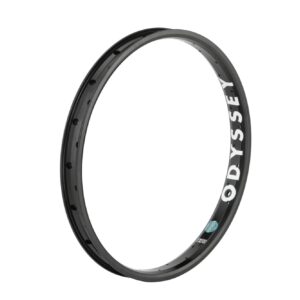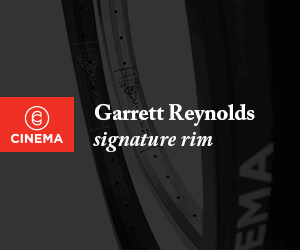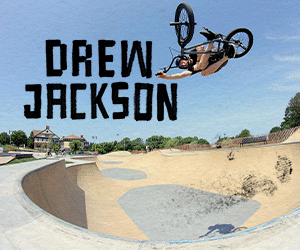Over the past few years I’ve had a lot of ups and downs on my bike due to an injury I suffered back in 2015.
It was Mother’s day and the weather was unusually good for the time of year. I’d jumped on the train and headed to Liverpool to film my GT bikes welcome edit and met up with two friends - Jack and Finley. We headed over to the university and they took me to a flat rail (about bar height with an 8ft drop down one side of it) and I decided I wanted to try a double peg to 180 down the drop. I took a few run ups then decided to send it. I hopped onto the rail and committed to the 180 but as I rotated my front tyre brushed the rail. I instantly knew it wasn’t going to end well. And I was right.
I took a pretty bad slam hitting the back of my head… and at the time I had no idea how much this was going to affect me in the future. Immediately, I was taken to hospital and spent the next five days there under close observation. The scans showed minor haemorrhaging and some air on the side of my brain, but I was assured this would “settle over time” and cause no further problems. I had also managed to fracture the front of my skull due to the impact to the back of my head, but this was also going to heal itself with no further problems. I also had to have stitches to close the wound on the back of my head. The hospital told me that I needed to live with a responsible adult for a few weeks to be constantly monitored, so I was to move back in with my parents and I was discharged into my mum’s care.
The bail had caused me to fall off the back of my bike with my head being the first point of contact with the ground. There was no way to brace myself for impact and my head took the full force of the blow. I didn’t lose consciousness but wasn’t sure what was going on around me as my friends dropped the camera and ran over to check on me. I kept trying to get up, only to collapse back with no sense of balance. My hearing had gone and I was bleeding out of both ears and my nose, plus I had split the back of my head open. The next thing I really remember was my very emotional and worried girlfriend being at the side of my hospital bed.
As the days became weeks I realised my sense of smell and taste had altered dramatically and this caused everything to have a chemical or sewage type odour and taste to it. After a few doctors appointments it was confirmed that it wasn’t my mum’s cooking, but I had severed the nerve connecting my nose to my brain. Eating became hard work and usually involved me sitting at the dinner table with a clothes peg on my nose to avoid the smell. Yes it was that bad. The months soon became a year but there were still no changes to my sense of smell or taste.
During this time I had also started to suffer mental health issues. Depression, anger, frustration and a huge lack of motivation in day-to-day life, became the norm. My memory became horrendous - I would constantly forget everything. By now I was relying on my girlfriend and mum to remind me of anything important. I also started to suffer from bad headaches, especially in the sunlight having to wear sunglasses constantly to avoid shearing pains. This all took a massive hit on my personal life, work life and my joy - riding. I found it very hard to socialise and motivate myself even with the thing I had so much time, love and passion for.
When I first started to notice the changes in my attitude and day to day moods I just felt strange. I couldn’t control my feelings and found myself losing my temper over the smallest of things, as if they meant the end of the world. I felt isolated from everyone around me. No one could understand how I felt and what was happening with me. People started to distance themselves as I was anti-social, moody and rude. Even close family couldn’t see the pain that I was going through. As it was so long since the accident I didn’t even see the relevance or connection myself.
That was until one evening, when I finally broke. I couldn’t bottle up my feelings any longer. I broke down in front of my partner. This was the first time she had seen the pain that I was in day-to-day, and how much I was struggling. Opening up to her and showing the most vulnerable side of me, was the scariest thing I have ever done.
"During this time I had also started to suffer mental health issues. Depression, anger, frustration and a huge lack of motivation in day-to-day life, became the norm."
It was from that moment though that things started to get better. A weight had finally been lifted. With my partner’s help and support, I then got to see the right people. We started with my local doctor and he was outraged that I’d never been seen again or given a follow up appointment, especially considering how severe my head injury had been the year before. He immediately arranged for me to go to the Walton Centre (The leading hospital for neuroscience in England) where I was given CT scans and X-rays to check my physical state, and then a thorough mental examination. These tests confirmed that I was suffering from severe post-concussion syndrome. This condition usually clears up after a few days or weeks, but in a few cases it has been known to last a few years or never go away. With that diagnosis I was then offered support through the hospital and given advice on support groups, where I could meet others with the same condition, to learn more about how to deal with it on a day-to-day basis. Just knowing that I had Post Concussion Syndrome and that the support was there for me to speak to someone gave me the confidence and guidance to move forward with my life.
So now with that support and that of my family, a few close friends and my long standing doctor, I have overcome most of my symptoms. Although I still have the occasional down days, I find that just being back on my bike is the best motivational tool I have at my fingertips. There isn’t a more freeing moment from your own mind and life’s problems than just rolling round the streets on my bike.
With a helmet on of course. – Sam Hulse
Sam is supported by our Official DIG Partners: GT
Reaching Out:
"Sometimes it will seem obvious when someone is going through a hard time, but there is no simple way of knowing if they have a mental health problem. Sometimes you don’t need to know. It’s more important to respond sensitively to someone who seems troubled than to find out whether or not they have a diagnosis.
Although certain symptoms are common with specific mental health problems, no two people behave in exactly the same way when they are unwell. If you know the person well, you may notice changes in their behaviour or mood." - More info




























